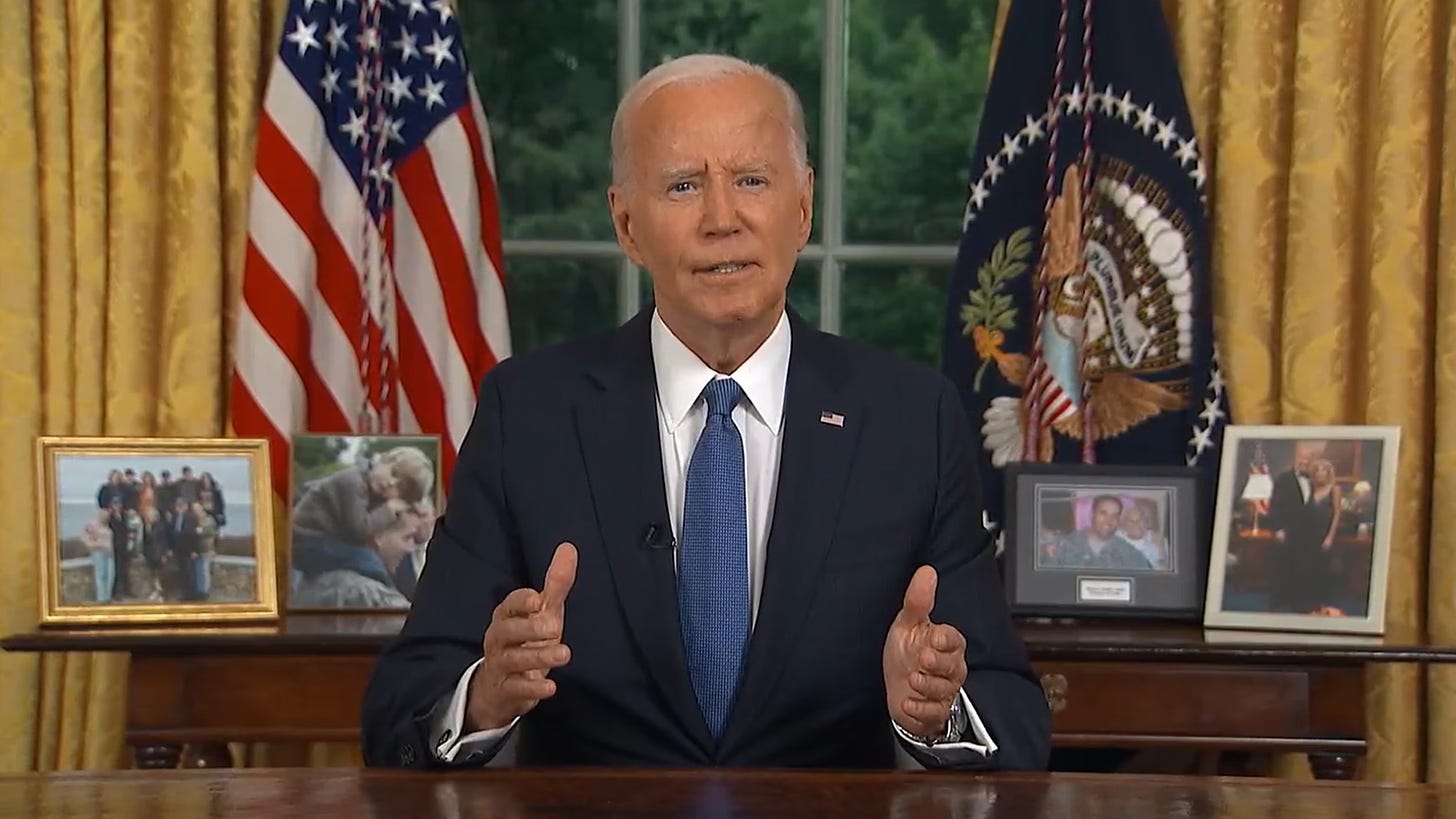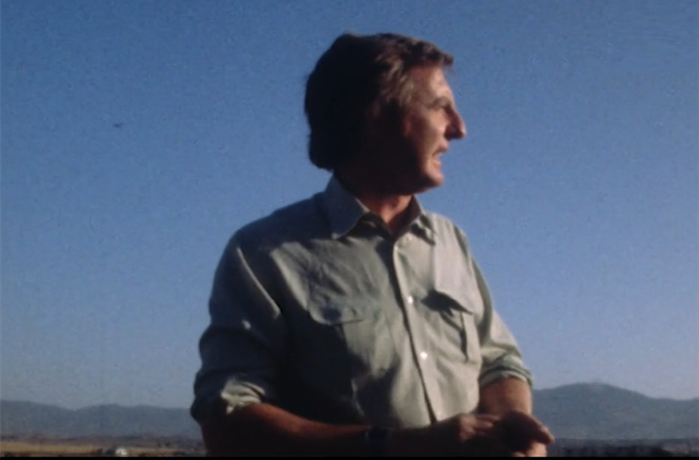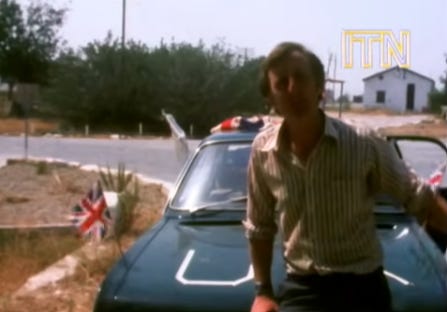Biden’s Announcement and how TV 'changed history'
Thoughts on TV News, journalism, and digital media. Issue#7
Welcome to my latest Substack newsletter. I’m a former TV news journalist, turned digital and media executive. This edition looks back at another busy week for the media - political upheaval in the US, BBC News and the Corporation’s Annual Report, and the anniversary of one of ITN’s biggest-ever exclusives.
How US media reacted to the Biden announcement
It’s been an extraordinary 4 weeks for the American media. The Biden-Trump debate, the Trump shooting, the Republican convention and selection of Trump’s running mate, Biden’s announcement, the endorsements for Kamala Harris, and then, finally, the address from the White House.
President Biden’s announcement that he would not run in the election broke at the weekend – and just as they had done with the Trump assassination attempt a week previously, it was the slimmed-down weekend newsroom teams that had to react to another massive breaking story.
AP’s David Bauder summarised the media’s performance. The story broke at 1.46 pm Eastern Time, and Bauder talks about how the networks were hampered by the lack of visuals on the story, and how experts were hard to track down on a Sunday afternoon. Presenters and commentators justifiably used strong language. CBS News’s Nora O’Donnell, for example, said: “It has been a wild few weeks”, and that the announcement was “a political earthquake”.
There’s no doubt that the events of the last 4 weeks have energised and stoked up media coverage, across the board. David Bauder ended his AP article by quoting the Fox News commentator Dana Perino: “The politics in the next four weeks is going to be absolutely insane”.
A big question now is which broadcaster will host the first debate between Donald Trump and what we assume will be Kamala Harris. There is the ABC one in the diary for September 10th, but the Trump team is keener on a proposed Fox News debate on 17th September. Yet again, the media focus is shifting towards a TV event.
In my newsletter in June, I argued that linear TV had played a key role in the UK 2024 election. I wrote:
“Despite being broadcast on legacy media, the live debates and the one-on-one TV interviews on the main, old-fashioned, linear TV channels were centre stage in this election, and shaped much of the agenda and direction of the campaign.
What went on in TikTok and Facebook was obviously important. Newspapers still had a big influence. Political podcasts had a new and interesting role. But the 2024 UK election campaign, I would argue, was very much a TV-dominated event.”
Well, it’s clear that TV has also had a decisive impact in the American election. The New York Times put it succinctly with the headline: “One Night of TV Canceled a President”. The newspaper said that Biden’s decision to bow out after a disastrous debate confirms that in a TikTok era, “TV is still the biggest political arena.”
The article by James Poniewozik went on:
"On Sunday, President Biden announced his withdrawal from the 2024 campaign, ending an astounding disintegration... This collapse, however, was not the result of an overseas war. There was no break-in and coverup. There was simply a horrendous TV outing — less than two hours that changed history."
Obviously, the 24-hour digital media played its part, with the TV debate clipped and repeated on social networks. And on a wider point, social media is definitely having a big impact in the elections in the US.
But it’s worth underlining that in our fragmented, digital world, traditional TV still has a key role.
A good report for BBC News - but cuts are on the way
The big TV News story in the UK, meanwhile, in the last week, was the BBC Annual Report. Most media coverage focused on presenter salaries and the recent Strictly Come Dancing row.
But tucked away in the detail of the report, there was interesting information on BBC News.
The Report was predictably upbeat about the performance of its news division. It pointed out that 75% of UK adults use BBC News on average per week, and it’s the world’s most trusted international news provider.
It talked about the successful setting up of BBC Verify in May, and the launch of the single news channel in April (saying that it is still the most-watched news channel in the UK, and has a worldwide audience of more than 100 million).
On Israel-Gaza, the BBC Director-General Tim Davie conceded that their coverage had “brought understandable but intense scrutiny”. But the news section of the report said, “our research has shown that when asked to choose the one provider they would turn to for impartial reporting, three times as many pick the BBC as choose our closest competitor.”
So, all well and good. In general, I think that BBC News has indeed had a good year, in what has been a challenging period across the news industry.
But hanging over the report, like a dark, ominous cloud, was the announcement that the BBC will lay off 500 more staff by March 2026, after the near doubling of its deficit to almost £500m ($646m).
I know from my days as a senior ITN manager, when we faced cutbacks in the 1990s, that this can have a corrosive impact. Worrying about budgets, uncertainty over job security, and attending leaving parties for respected and experienced colleagues. It’s not an ideal scenario for any organisation.
The 50th anniversary of the Cyprus invasion
Meanwhile, this month has seen the 50th anniversary of the Turkish forces landing in Cyprus. It’s sad to think that 50 years on, Cyprus is still split - and that Nicosia is now the only divided capital city in the world.
But for the British TV news organisation ITN1, it’s also the anniversary of one of the company’s biggest-ever exclusives - a story that is firmly embedded in ITN folklore.
Because their car had run out of petrol, the reporter Michael Nicholson and cameraman Alan Downes later ended up being the only team of journalists directly inside the Turkish paratroopers’ dropping zone outside Kyrenia. The film of the troops landing was flown back to the UK and led News at Ten. The ITN pictures were also the top story in the US, on ABC, CBS and NBC.
In the latest edition of the ITN 1955 Club magazine, former ITN reporter Sam Hall has written an extraordinary account of ITN’s coverage. Sam was the fixer on the story, overseeing 11 reporters and 13 camera staff. It was his first foreign assignment for ITN. He wrote:
As one paratrooper prepared to land, Alan pointed his CP16 and filmed him – and I have always thought what a huge risk that was. He was lucky not to have been shot. Once the Turk’s feet touched the ground, Mike Nicholson walked up to the soldier and said: ‘My name’s Nicholson. How do you do?’
A few days later, the British Daily Mail wrote: "If ITN does not collar all the Newsreel of the Year awards for its footage from Cyprus this week, then the prizes will not be worth their silver plating."
A long time ago now. Both Michael Nicholson and Alan Downes are sadly no longer with us. It was the days of film, of course, when one of the biggest challenges was how to get the content back to London. In this case, the ITN team managed to persuade the RAF to fly it back from the British air base in Cyprus. But it was also an important event for ITN in further establishing itself as a serious competitor to both the BBC and the American networks.
The ITN archive department has posted some amazing film from the 1974 Cyprus story on YouTube this month. In one sequence it shows Michael Nicholson standing next to the ITN car, just after getting caught up in crossfire. Here’s a screen image from Michael’s piece to camera in the film:
It couldn’t be more different from how TV crews operate today. Not a flak jacket or helmet in sight. Their only protection - a definitely un-armoured 1970s car, with union jacks, white flags, and camera tape on the bonnet spelling out the letters UK.
You can read Sam Hall’s full article here.
Worth reading…
TalkTV
The Press Gazette has reported that TalkTV has hit 1m YouTube subscribers and has grown revenue after closing down its linear TV service last year. (Read here - Press Gazette)
Mumsnet v OpenAI
My former ITN colleague Graham Lovelace (@glovelace) writes about the news that the parenting network Mumsnet has launched legal action against OpenAI, accusing it of scraping its six-billion-word website without consent and breaching its copyright. (Read here - Charting GEN AI)
Substack
An article from the Substack co-founder Hamish McKenzie (@hamish) about how traditional media publications are starting to use the platform. (Read here - Disjointed)
Thanks for reading The News Angle! Subscribe for free to receive new posts.
For non-UK readers, ITN is the leading commercial TV news organisation in the UK, and produces the TV news programmes on the main commercial channels - ITV, Channel 4 and Channel 5. The ITN 1955 Club is for people who worked at ITN. It produces a monthly magazine, The ITN 1955 Newsletter, about ITN history and TV news. Its name is linked to the year that ITN was founded.







